
Let's assume, just for a minute, that the accepted norm is that all organisations have Twitter feeds, Facebook pages and a website or two. How does that area of work stack up against the daily churn of media enquiries, press releases and marketing & communications plans?
And how do we manage the growth in demand for all of this work against a backdrop – for many - of cuts and reduced resources?
There are no simple, obvious answers but something has to change. We need to evolve.
My observation is that most – but not all - organisations simply bolt new and social media onto the ‘day jobs’ of press and communications officers. That is fine to a point and these people absolutely must use social media. They must also understand the pros and cons of social media, alongside all other channels, when deciding on the best way of engaging and communicating with customers.
But the problem is that the 'day job' and its demands continue to grow, and grow, and grow…
Creating one ‘social media officer’ post won’t do the job either, no matter how brilliant they are. It’s a more radical transition that is required.
Is it still right that such as large percentage of the time and resource within a comms team is still dedicated to traditional media channels?
So something has to give. I’m sure I’m not alone in this thinking.
The stats and the 'math' are compelling – you’ve all seen them, you don’t need me to tell you again that the growth of digital and social media, coupled with the decline in print media, is reason enough to adapt.
But the real benefit is that this approach could deliver greater and real engagement with our customers and the opportunity to talk to them on a more human level. And, vitally, talk to customers about the stuff that is important to them.
And that has potential spin-offs both ways.
But are press officers, for example, ready for this change?
For the ones I know, yes. Many have already embraced change and use the full range of channels available to them – traditional and new.
But I do get a sense that some are still just churning out press releases all day long. And with an ever decreasing pool of local newspapers to send these releases to is that still right?
Comms folk who don’t evolve and learn these new skills pretty sharpish could find themselves well behind the curve in a short space of time.
So if this all strikes a chord and you know you need to change, but are struggling with getting started, what can you do right now?
One approach is to have someone internally who can blaze a bit of a trail, support and encourage and get things moving in the right direction.
So, if that’s your start point internally, here’s six tips for getting yourselves better prepared for 2012:
- support people at the coalface. Work with the service areas our customers say are important to them and look at the new channels available to engage with them. One corporate account is fine but it will only get you so far.
- monitor and report back. How are these service accounts working? How are customers benefiting?
- fly the flag internally. Go out and evangelise a little. This may mean doing the rounds at management meetings.
- do more with Facebook. The user numbers are enormous. But the trick is finding the way of using this platform. A corporate account is unlikely to be hugely appealing to residents but give them the information they want - such as school closures during the winter - and your numbers can fly. Just look at what Northumberland and Coventry have achieved.
- do your research. You’ll need good, robust case studies for why service areas should be considering this activity. Make sure you ask your own customers what info they want and how they prefer to receive it too – social media will be one route but for other groups, more traditional methods will still be best.
- developing comms plans. Make sure that your comms people are considering all relevant social media channels when drawing up wider comms plans. But don’t just tweet your press releases or post them to Facebook – the tone and delivery of the message has to be different to work across these platforms.
We’re keen to hear how others are adapting – why not share your experiences here join the chat
